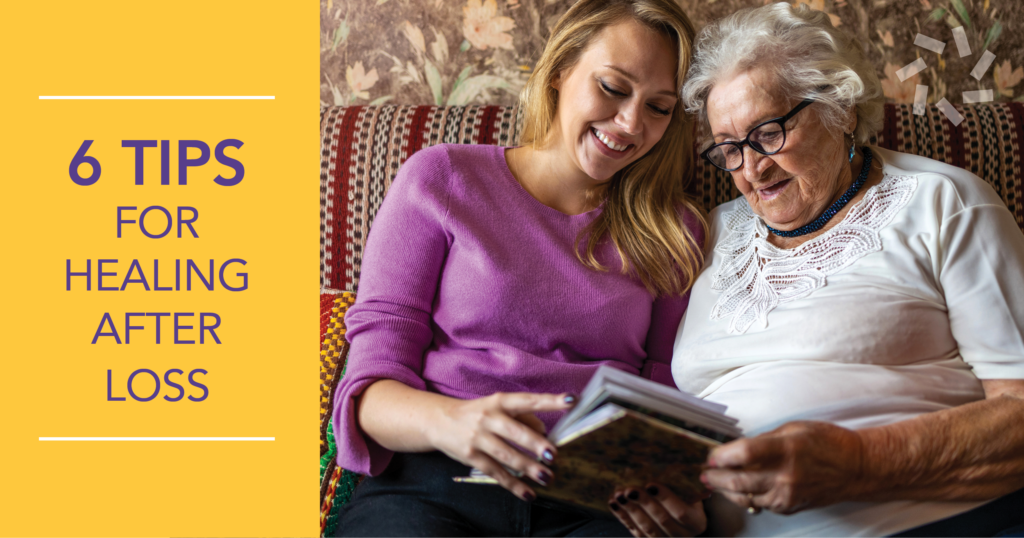
Read time: 2 minutes
“Even though death, loss, and grief are universal experiences, it’s important to remember that there is no universal response to loss, nor is there a set timeframe for grieving—it takes as long as it takes,” said Jackie Bohrer, MSW, LICSW, Lifespark Hospice Bereavement Coordinator/Grief Counselor, a role she helped develop to support family members for 13 months following the death of their loved one.
Most people need some time after the initial shock of a loss, Jackie said, so she waits a couple of weeks before sending a note of condolence with her business card. Five weeks later, she sends a letter describing the kind of grief support Lifespark offers to families and follows up with a phone call to ask how they’re doing. “I’m very aware that I’m a complete stranger to them, but I want them to know that we’re here to support them,” she said. In addition to these early connections, families receive three more mailings from Lifespark Hospice.
Facing grief
Between 10 and 15 percent of families seek out Lifespark Hospice bereavement counseling, some for just a session or two, others monthly for a year. In the fall, Lifespark hosts an annual Memorial Celebration for family members that Lifespark has served in Hospice. “Losing a loved one can bring up past losses that may not have been resolved or grieved—something we call compounded loss,” Jackie said. “We can heal from loss, but it takes time.”
One of her favorite quotes on grief comes from Rabbi Dr. Earl Grollman, an author and nationally known expert in the field of grief counseling who worked with families, volunteers, and survivors of the 1995 Oklahoma City bombing and the 9/11 attacks:
“Grief is not a disorder, a disease, or a sign of weakness.
It is an emotional, physical, and spiritual necessity, the price you pay for love.
The only cure for grief is to grieve.”
Real-world experience
Through her work as a clinical therapist, crisis counselor, artist, religion teacher, campus minister, and bereavement counselor, Jackie has learned how important it is to validate and normalize each person’s unique response to loss. She has also learned from her personal experiences of loss.
“What I know is that grief demands to be felt, in our bodies and in our brains, but with a lot of patience, compassion, and self-care, healing is possible,” she said. “Grieving isn’t a linear experience; it’s up and down and messy.”
Jackie sees self-care as a critical practice for honoring the grieving process. She offered the following suggestions for self-care:
- Listen to your body. Grief can affect the body in all sorts of surprising ways—aches and pains, muscle tension, illness, panic attacks, exhaustion, indigestion, loss of appetite, headaches, nightmares, changes in taste or smell. Give your body time to rest and recover.
- Attend to yourself. Create a daily schedule and follow it to the best of your ability. Eat nourishing meals, and drink lots of water. Limit alcohol use—it’s both a depressant and a sleep disruptor. Limit caffeine if it disturbs your sleep. Focus on your health, especially if you were a caregiver. Stay active, spend time outside, and take a nap when you need one.
- Think about your past. Allow yourself to think about the losses you have experienced throughout your life. How did they affect you? Were you able to grieve? What worked? What didn’t? Ask others how they have managed their own losses, keeping in mind that the experience of loss is completely individual.
- Create a space for yourself. Find a place in your home you can turn into a nurturing environment with candles (real or battery-operated), essential oil diffuser, cozy blanket, yoga mat, meditation books, journal, headphones—whatever feels calming and healing to you.
- Lean on your support system. Think about what you need and ask friends and family for help—to bring you a meal, join you for a walk, or help you sort through your loved one’s belongings. You can also ask for other kinds of support, such as patience, and a listening ear offering advice only when asked.
- Express your grief. Capture memories, poetry, daily gratitudes, or inspiring quotes in a journal. Paint, draw, or sculpt. Pick up an instrument, listen to music, dance, do yoga, or meditate. Knit, crochet, or embroider. Cook, bake, or plant flowers or vegetables. Find comfort in what inspires you.
Stories of healing
Since joining Lifespark in May 2023, Jackie has had a front-row seat to the healing process though family members who are finding their way through grief. She shared the following snapshots of individuals who have lost a spouse or a parent.
- Ed immersed himself in learning all about plants and spent the following summer growing beautiful flowers in his yard.
- Mary began reading a daily passage from “Healing After Loss” by Martha Hickman, a practice that put her in a better frame of mind.
- Roger offered his skills at a language center for immigrants and began tutoring Spanish speakers in English.
- Peter decided to take banjo lessons because music seemed to ease his sadness.
- Barbara started knitting slippers. Each time she gifted a pair, she felt satisfied in creating something concrete when she felt so empty.
- John joined a support group for people who had lost their spouse and found it helpful to be with others who understood.
Asked to summarize the biggest takeaways from this work, Jackie said that it’s about the choices we make in how we move forward. “Just as everyone responds differently to loss, there is no single right way to heal, no set timeframe, no set of rules,” she said, adding that the opportunity each day is to experience moments of healing, however they present themselves.
A passage that Jackie found helpful during her own grieving process is from Martha Hickman’s book, Healing After Loss: We have choices. We can hide or tear around mindlessly or we can look around, see where the windows are and where doors open into the future. Since the door we came through is closed, we can look for people who can help us—and begin to attend to THIS life, day by day.
Along this grief journey, Lifespark is here to support our clients and their families as they discover how to live with loss so they can find their way back to aging magnificently.
To learn more about our approach to end-of-life care and bereavement support, visit Lifespark Hospice.



